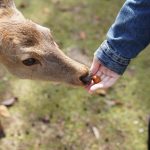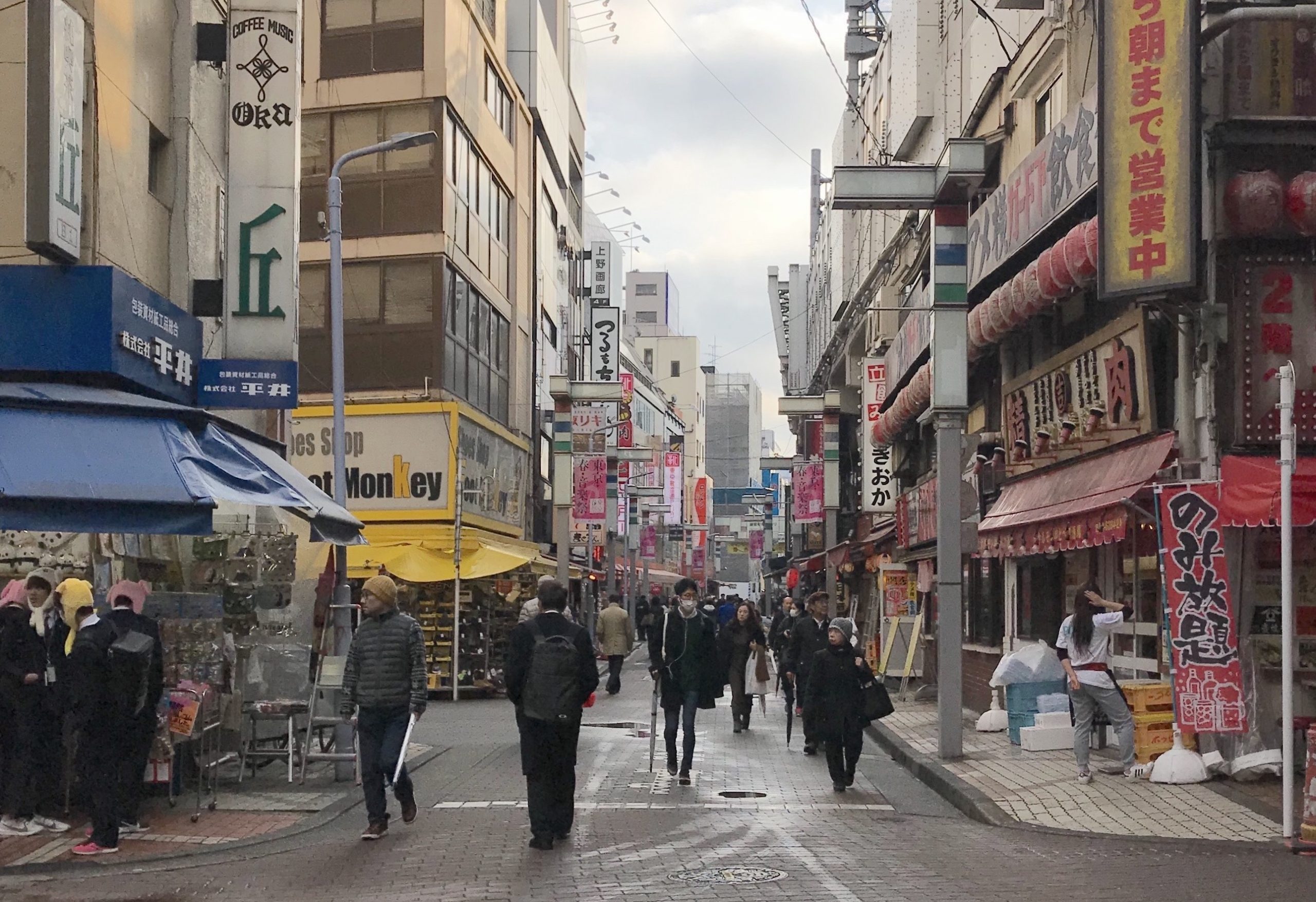Basic Verb Grouping for Deciding Your Particles
Contents
- The Verbs of Existing
- The Verbs of Giving
- The Verbs of Receiving
- The Verbs of Moving in One Direction
- The Verbs of Activities Occurring at One Place
- The Verbs of Moving About
- The Verbs of Leaving a Place
*******************************
1. The Verbs of Existing
- be います imasu
- be あります arimasu
- stay います imasu
We call this kind of verbs the Verbs of Existing. The reason is they express the state of existing, being or staying at one place.
With these verbs, when we mention the location of the existence, the location word is always followed by “ni” (に).
FYI, Related Post: => The Particle “ni"
As you may already know, we mark the subjects with a following “ga” (が) or “wa” (は), depending on the situation.
Example: コンビニに電池があります。Konbini ni denchi ga arimasu. (There are some batteries at the convenient store.)
2. The Verbs of Giving

- (I) give あげます agemasu
- (I) give (to children, pets or plants) やります yarimasu
- (someone) gives (me) くれます kuremasu
- lend 貸します kashimasu
- teach 教えます oshiemasu
- make a phone call 電話します denwa-shimasu, 電話をかけます denwa o kakemasu
- send 送ります okurimasu, 出します dashimasu
We call these verbs, but not exclusively, the Verbs of Giving. The reason is they generally mean a transfer of a thing from the speaker to another (or others).
With these verbs, we often mention the recipient. The word for that person is always followed by “ni” (に).
FYI, Related Post: => The Particle “ni"
As for the subjects, we mark them with a following “ga” (が) or “wa” (は), depending on the situation.
Example: 私は母に電話します。Watashi wa haha ni denwa-shimasu. (I call my mom.)
3. The Verbs of Receiving

- receive もらいます moraimasu
- borrow 借ります karimasu
- learn 習います naraimasu
We call these verbs, but not exclusively, the Verbs of Receiving. The reason is they generally mean a receipt of a thing (including knowledge) by the speaker from another (or others).
With these verbs, we often mention the person from whom we receive, borrow, rent, or learn. The word for that person is always followed by “ni” (に).
FYI, Related Post: => The Particle “ni"
We mark the subjects with a following “ga” (が) or “wa” (は), depending on the situation.
Example: 私は友達にパソコンを借ります。Watashi wa tomodachi ni pasokon o karimasu. (I will borrow a personal computer from my friend.)
4. The Verbs of Moving in One Direction
- go 行きます ikimasu
- come 来ます kimasu
- return (to your home or where you consider home) 帰ります kaerimasu
- (speaking of your residence, workplace, etc.) move 引っ越します hikkoshimasu
- bring [a thing] 持って来ます motte-kimasu
- take [a thing] 持って行きます motte-ikimasu
- bring [a person] 連れて来ます tsurete-kimasu
- take [a person] 連れて行きます tsurete-ikimasu
- arrive (for this, “に” sounds better than “へ” to show the destination) 着きます tsukimasu
We call this kind of verbs, but not exclusively, the Verbs of Moving in One Direction. The reason is they generally mean the moving of your position in one direction, or travelling from one place to another.
With these verbs, we often mention the destination. The word for the destination is always followed by “e” (へ) or “ni” (に).
FIY, Related Post: => The Particle “e” and The Particle “ni"
The subjects are marked with a following “ga” (が) or “wa” (は), depending on the situation.
Example: 私は日本へ行きます。Watashi wa nihon e ikimasu. (I’m going to Japan.)
5. The Verbs of Activities Occurring at One Place
- eat 食べます tabemasu
- sleep 寝ます nemasu
- work 働きます hatarakimasu
- meet (someone) 会います aimasu
- teach 教えます oshiemasu
- learn 習います naraimasu
- dine 食事します shokuji-shimasu
- wait 待ちます machimasu
- hurry 急ぎます isogimasu
- help 手伝います tetsudaimasu
- talk 話します hanashimasu
- use 使います tsukaimasu
- show 見せます misemasu
- make 作ります tsukurimasu
- cook 料理します ryoori-shimasu, ~を作ります tsukurimasu
- pay [money] 払います haraimasu
- lose なくします nakushimasu
- be born 生まれます umaremasu
We call these verbs, but not exclusively, the Verbs of Activities Occurring at One Place. The reason is they generally mean an activity which takes place at one place without moving to another place.
With these verbs, when we mention the location of occurrence, the word for the location is always followed by “de” (で).
FYI, Related Post: => The Particle “de” (で)
We again mark the subjects with “ga” (が) or “wa” (は), depending on the situation.
Example: 私は飛行機で寝ます。Watashi wa hikooki de nemasu. (I will sleep in the airplane.)
6. The Verbs of Moving About
- walk 歩きます arukimasu
- run 走ります hashirimasu
- drive (a car) (車で) 走ります hashirimasu
- take a walk 散歩します sanpo-shimasu
- travel 旅行します ryokoo-shimasu
- [Whales, salmon and other creatures that swim in wide space] swim 泳ぎます oyogimasu
- give a tour [of a place] 案内します annai-shimasu
We call these verbs, but not exclusively, the Verbs of Moving About. The reason is they generally mean an activity of moving in unlimited space.
With these verbs, we often mention the space we move around in. The word for the space is always followed by “o” (を).
FYI, Related Post => The Particle "o" (を)
We mark the subjects with “ga” (が) or “wa” (は), depending on the situation.
Example: 私は公園を散歩します。Watashi wa kooen o sampo-shimasu. (I take a walk in the park.)
7. The Verbs of Leaving a Place
- leave, go out of [a place] 出ます demasu
- graduate from [a school] 出ます demasu
- get off/out [a vehicle] 降ります orimasu
- run out, jump out of [a place] 飛び出します tobidashimasu
We call these verbs, but not exclusively, the Verbs of Leaving a Place. The reason is they generally mean an activity of leaving a place.
With these verbs, we often mention the place we leave. The word for the place is always followed by “o” (を).
FYI, Related Post => The Particle "o" (を)
The subjects are marked with “ga” (が) or “wa” (は), depending on the situation.
Example: 私は喫茶店を出ます。Watashi wa kissaten o demasu. (I will leave the coffeeshop.)
From our experience, these are the most confusing particles at the beginning, even at the intermediate level. We hope this helps you.




